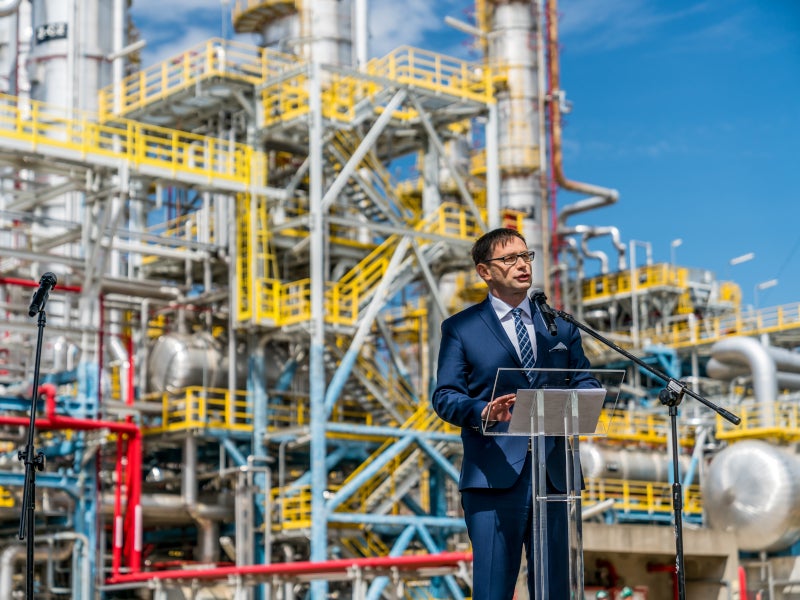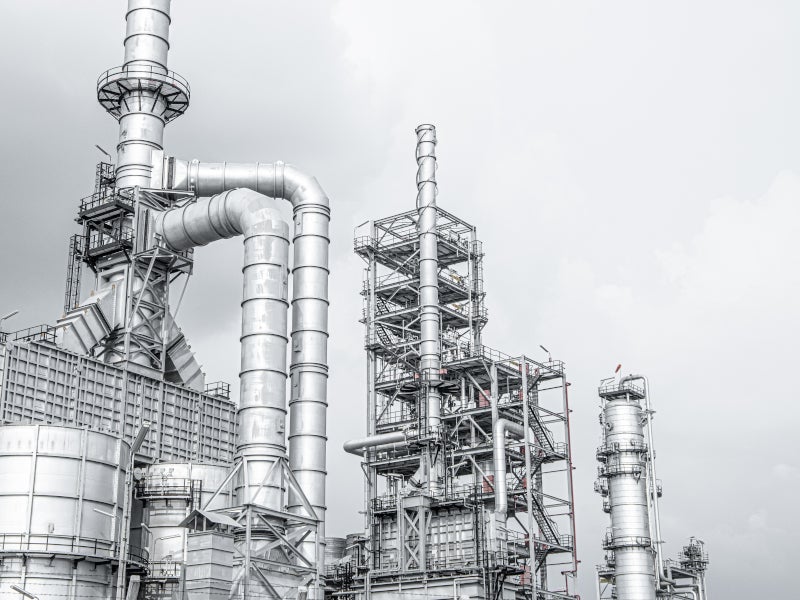The Plock refinery is part of an integrated refining and petrochemical production complex in Plock, Poland, which is owned and operated by PKN Orlen. The Polish state holds a 27.59% stake in PKN Orlen.
The Plock refinery has been operating since 1964, and its current processing capacity is approximately 16.3 million tonnes per annum (Mtpa) with a Nelson complexity index of 9.5. The production capacity of the Olefins unit within the refinery and petrochemical complex is approximately 700,000t of ethylene and 380,000t of propylene.
The oil refinery is currently undergoing upgrade and modernisation to boost operational efficiency and increase the fuel yields per barrel of crude while enabling the production of high-margin products.
The refinery modernisation involves the installation of a new visbreaking unit, upgrade to the existing hydrocracking and diesel hydrotreater units, and the refurbishment of the combined heat and power (CHP) plant in Płock.
Location
The Plock integrated refining and petrochemical production complex is located in Plock, Poland, approximately 120km northwest of Warsaw.
Refinery details
The various processing units in the refinery include crude distillation units, a cracking unit, an alkylation unit, a reforming unit, an isomerisation unit, a vacuum residue desulphurisation unit, a diesel fuel hydrodesulfurisation unit, a hydrocracking unit, and a petroleum tar hydrodesulfurisation unit.
Distillation, hydrogenation, conversion of nitrogen and oxygen compounds, removal of sulphur and benzene, dearomatisation, and demetallisation comprise the major steps in the refinery’s process flow sheet.
Visbreaking unit
A new visbreaking unit is being constructed at the Plock facility to improve the operational efficiency of the refinery. With a design capacity of 3,300t of feedstock a day, the unit will increase the overall petrol and diesel yields of the refinery.
The construction of the visbreaking unit was started in July 2020 with its commissioning expected in December 2022. The total investment for the visbreaking unit is approximately £202m ($252m).
The visbreaking unit is expected to increase the fuel yields from crude processing by 2% while increasing the annual EBITDA of the PKN Orlen’s refinery by £84m ($105m).
The new unit will process the vacuum residue to produce petrol and diesel. The vacuum residue was earlier processed to produce heavy fuel oils and asphalt.
Apart from the new visbreaking unit, a hydrocracking unit and a diesel hydrotreater unit are also being upgraded as part of the refinery modernisation programme.
After the completion of the upgrade to the hydrocracking and diesel hydrotreater units in late 2020, the refinery’s annual diesel oil output is expected to be increased by 150,000t.
Power facility upgrade
The turbine generator set No. 1 (TG1) at PKN ORLEN’s combined heat and power (CHP) plant at Płock will also be replaced as part of the refinery upgrade and modernisation programme. The new turbine generator set, scheduled to come online in September 2021, will have a capacity of 65MW.
The Plock CHP plant comprises seven turbine generator sets. The existing 55MW-capacity TG1 set, which started operation in 1968, has completed maximum service life of approximately 300,000 hours. The TG2, TG3, TG4, and TG5 sets that are approaching maximum service life are also expected to undergo upgrades and modernisation after the TG1. The TG6 and the TG7 sets were built in 2001 and 2017 respectively.
The Płock CHP plant is claimed to be the largest industrial unit of its kind in Poland. The plant’s electrical capacity is 413.6MW and thermal capacity is 2,149MWt. The plant supplies electricity and heat to the refinery as well as outside customers. The new TG1 will increase the CHP plant’s heat and power cogeneration efficiency by 10%.
Contractors involved with the Plock refinery upgrade
A consortium of KTI Poland and IDS-BUD was awarded the turnkey contract for the design, procurement, construction, installation, commissioning, and start-up of the visbreaking unit at the Plock refinery in February 2020.
KTI Poland is responsible for the design and delivery of equipment while IDS-BUD is responsible for the supply of bulk materials and implementation of all construction and installation works.
The IDS-BUD work scope includes the installation of pipelines, heat exchangers, process coolers, pumps, compressors, reactors, columns, tanks, filters, petrochemical heater with chimney, overhead cranes, stirrers, dashpots as wells as the construction of electrical substations, compressor sheds, flood chambers.
The visbreaking technology for the unit is licensed from Shell and CB&I Nederland B.V.
Axens entered into an agreement with PKN Orlen to provide a license and the basic engineering design for the vacuum residue hydro desulphurisation (HOG) unit upgrade at Plock refinery in May 2020.
GE Steam Power, a unit of General Electric (GE), was contracted to supply a new steam turbine generator set for the Plock CHP plant in August 2019. The contract also includes providing Predix Asset Performance Management (APM) cloud-based software, as well as a 10-year service agreement. The steam turbine and the generator will be manufactured at the GE plants in Elbląg and Wrocław respectively.
CKTiS secured a contract for the disassembly of the existing turbine generator set No. 1 (TG1).





